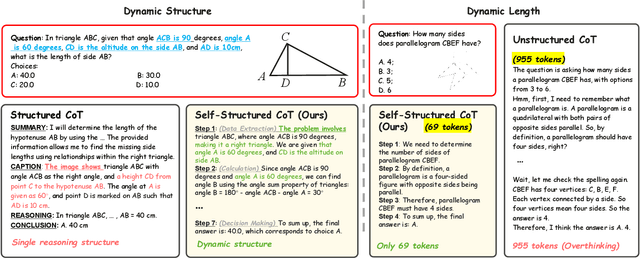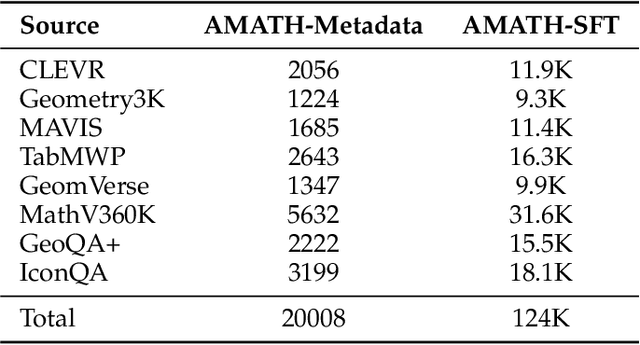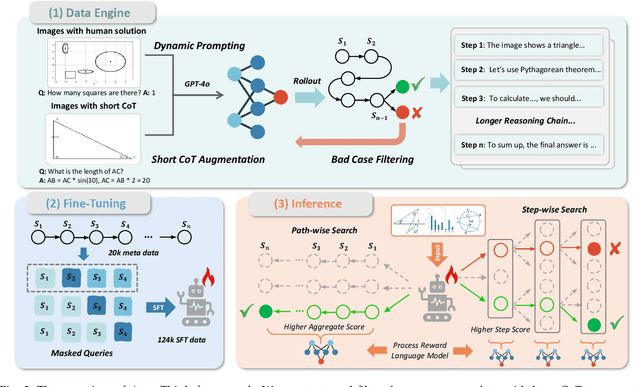Haoxiang Fan
Can Atomic Step Decomposition Enhance the Self-structured Reasoning of Multimodal Large Models?
Mar 08, 2025Abstract:In this paper, we address the challenging task of multimodal mathematical reasoning by incorporating the ability of "slow thinking" into multimodal large language models (MLLMs). Our core idea is that different levels of reasoning abilities can be combined dynamically to tackle questions with different complexity. To this end, we propose a paradigm of Self-structured Chain of Thought (SCoT), which is composed of minimal semantic atomic steps. Different from existing methods that rely on structured templates or free-form paradigms, our method can not only generate cognitive CoT structures for various complex tasks but also mitigates the phenomenon of overthinking. To introduce structured reasoning capabilities into visual understanding models, we further design a novel AtomThink framework with four key modules, including (i) a data engine to generate high-quality multimodal reasoning paths; (ii) a supervised fine-tuning process with serialized inference data; (iii) a policy-guided multi-turn inference method; and (iv) an atomic capability metric to evaluate the single step utilization rate. We conduct extensive experiments to show that the proposed AtomThink significantly improves the performance of baseline MLLMs, achieving more than 10\% average accuracy gains on MathVista and MathVerse. Compared to state-of-the-art structured CoT approaches, our method not only achieves higher accuracy but also improves data utilization by 5 times and boosts inference efficiency by 85.3\%. Our code is now public available in https://github.com/Quinn777/AtomThink.
LitLinker: Supporting the Ideation of Interdisciplinary Contexts with Large Language Models for Teaching Literature in Elementary Schools
Feb 22, 2025



Abstract:Teaching literature under interdisciplinary contexts (e.g., science, art) that connect reading materials has become popular in elementary schools. However, constructing such contexts is challenging as it requires teachers to explore substantial amounts of interdisciplinary content and link it to the reading materials. In this paper, we develop LitLinker via an iterative design process involving 13 teachers to facilitate the ideation of interdisciplinary contexts for teaching literature. Powered by a large language model (LLM), LitLinker can recommend interdisciplinary topics and contextualize them with the literary elements (e.g., paragraphs, viewpoints) in the reading materials. A within-subjects study (N=16) shows that compared to an LLM chatbot, LitLinker can improve the integration depth of different subjects and reduce workload in this ideation task. Expert interviews (N=9) also demonstrate LitLinker's usefulness for supporting the ideation of interdisciplinary contexts for teaching literature. We conclude with concerns and design considerations for supporting interdisciplinary teaching with LLMs.
AtomThink: A Slow Thinking Framework for Multimodal Mathematical Reasoning
Nov 18, 2024



Abstract:In this paper, we address the challenging task of multimodal mathematical reasoning by incorporating the ability of ``slow thinking" into multimodal large language models (MLLMs). Contrary to existing methods that rely on direct or fast thinking, our key idea is to construct long chains of thought (CoT) consisting of atomic actions in a step-by-step manner, guiding MLLMs to perform complex reasoning. To this end, we design a novel AtomThink framework composed of three key modules: (i) a CoT annotation engine that automatically generates high-quality CoT annotations to address the lack of high-quality visual mathematical data; (ii) an atomic step fine-tuning strategy that jointly optimizes an MLLM and a policy reward model (PRM) for step-wise reasoning; and (iii) four different search strategies that can be applied with the PRM to complete reasoning. Additionally, we propose AtomMATH, a large-scale multimodal dataset of long CoTs, and an atomic capability evaluation metric for mathematical tasks. Extensive experimental results show that the proposed AtomThink significantly improves the performance of baseline MLLMs, achieving approximately 50\% relative accuracy gains on MathVista and 120\% on MathVerse. To support the advancement of multimodal slow-thinking models, we will make our code and dataset publicly available on https://github.com/Quinn777/AtomThink.
 Add to Chrome
Add to Chrome Add to Firefox
Add to Firefox Add to Edge
Add to Edge